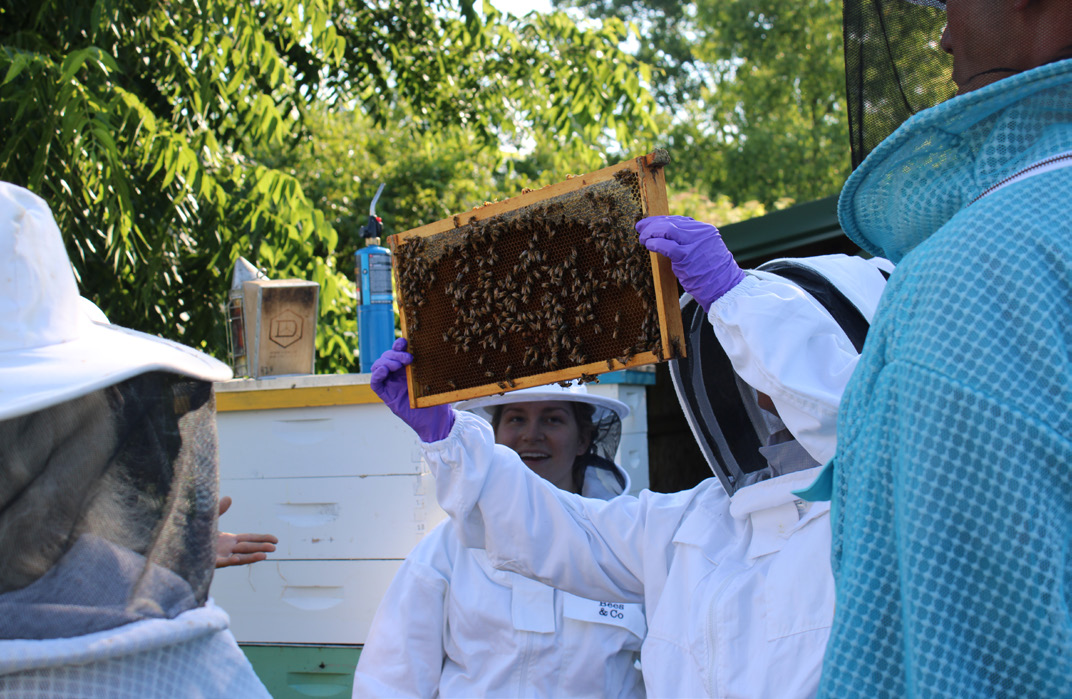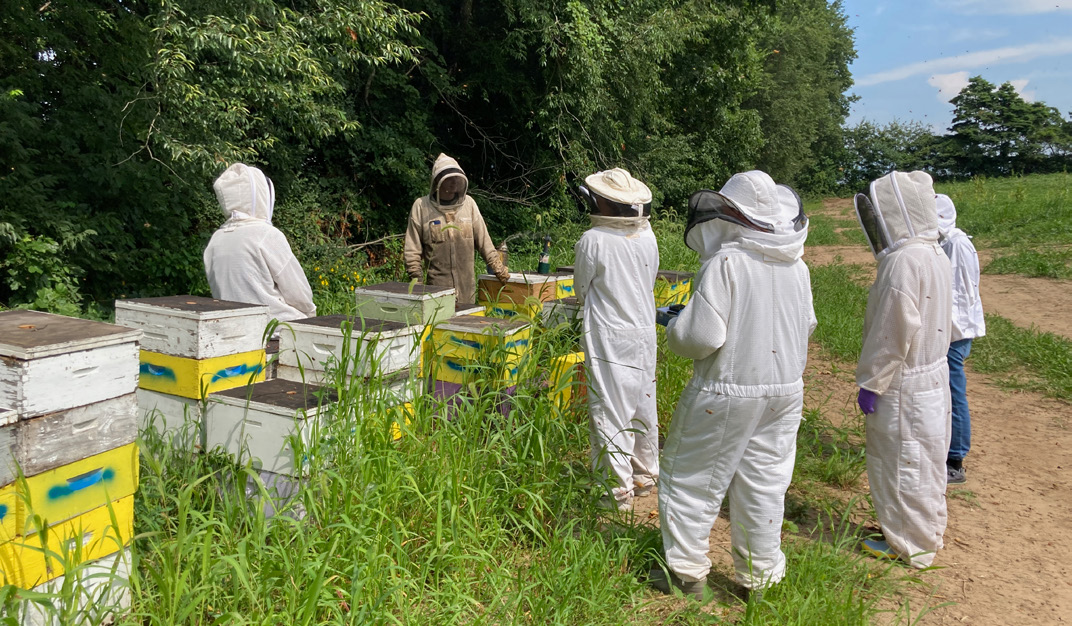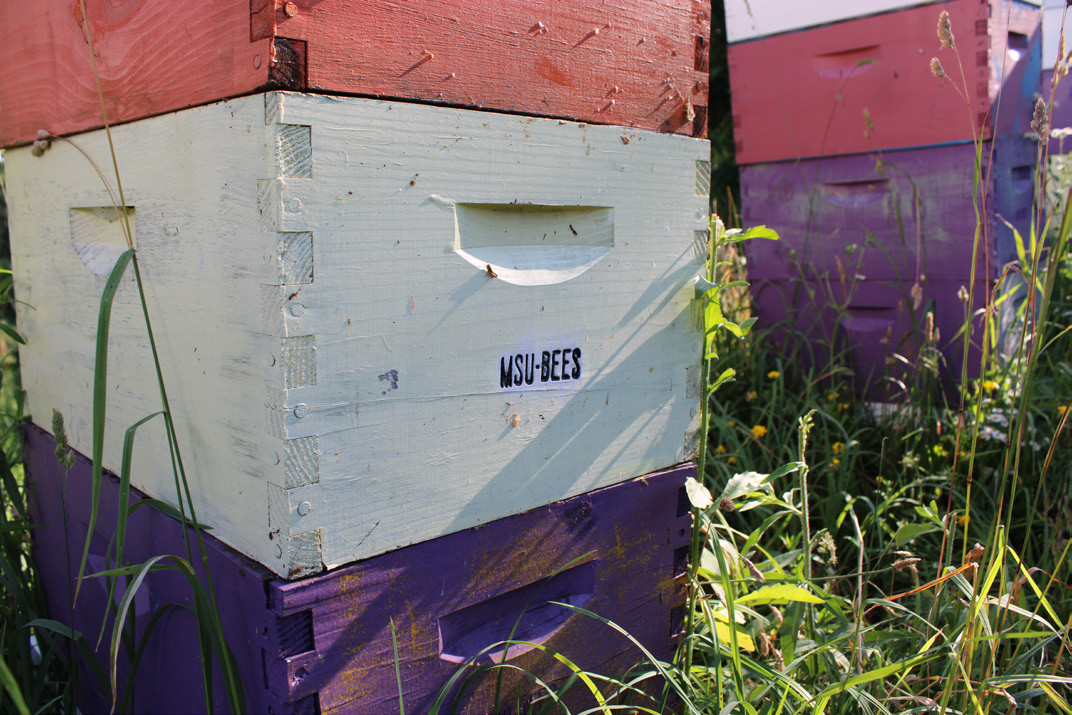
Supporting Beekeepers & Protecting Pollinators
DOWNLOADJuly 24, 2023 - Michigan State University Extension
Impacts
Michigan beekeeper education program evaluations across 20 apiculture programs in 2022 showed that the programming was useful:
- Over 100 programs on pollinators were delivered by MSU Extension in 2022.
- Over 12,000 participants took part in pollinator programs in 2022.
- Over 500 questions were responded to by MSU Extension about beekeeping, pollination and pollinator concerns in 2022.
- 97% of participants reported that their knowledge of the subject increased.
- 85% of participants reported that their skill level increased.
- 73% of participants reported that they intended to make a change to improve honey bee colony health as a result of the information presented.
- 66% of participants reported that if they implemented changes in their operation based on what the learned, it would have an impact on their operation's profitability.
"I really enjoyed and look forward to these meetings. Keep up the good work. Great information that meets the needs of beekeepers." -2022 Michigan Beekeeping Office Hours webinar program participant
For more information, visit https:// pollinators.msu.edu/questions.
Education for Michigan Beekeepers
MSU Extension’s apiculture team provides information and resources for beekeepers to improve honey bee management and health. This outreach is done through various channels.
Presentations at beekeeping association meetings and conferences
MSU Extension presents to beekeepers at local bee schools, beekeeping association meetings, and statewide conferences. Every year, MSU Extension collaborates with the Michigan Beekeepers Association to host its spring and fall conferences. These conferences are attended by hundreds of beekeepers statewide, the majority of whom are small-scale and hobby beekeepers. Michigan is home to about 30 local beekeeping clubs, and MSU Extension was invited to give presentations at several meetings for these local associations. MSU Extension also works with Michigan’s large-scale, migratory beekeeping operations and presented at the 2022 Michigan Commercial Beekeepers Association’s annual meeting.

Webinars for beekeepers
MSU Extension hosted a series of webinars in 2022 for beekeepers. Each month from April through September, MSU Extension’s apiculture team discussed seasonal beekeeping topics and answered questions from beekeepers. The team also hosted two webinars for beekeepers with guests on special topics. An educator from Penn State University presented on spotted lanternfly, a pest recently found in Michigan, and what it means for beekeepers. An MSU Extension farm business management educator delivered a webinar titled “Farm Budgets: Turning Your Beekeeping Hobby into a Business.”

In-hive beekeeping workshops
MSU Extension delivered in-hive workshops for small-scale and hobby beekeepers at three locations in Michigan. Some of these workshops were specifically for beekeepers enrolled in the Heroes to Hives program, which serves U.S. military veterans, reservists, active duty military members, National Guard members of the U.S. Armed Forces, and their spouses and adult children. The workshops covered topics such as hive handling, colony inspections, and integrated pest management. In addition, the MSU Extension apiculture team provided in-hive workshops and information to others who support beekeepers or want to learn about honey bees, including inspectors from the Michigan Department of Agriculture and Rural Development, veterinarians, reporters, teachers, and MSU students.
Pollinator stewardship programming for pesticide applicators, including growers and farmers, showed that MSU pollinator stewardship programming was impactful:
- 99.5% of participants reported that their knowledge of the subject increased.
- 79% of participants reported that they intended to make a change to improve pollinator health.
Pollinator Stewardship & Protection
MSU Extension encourages growers, pesticide applicators, home gardeners and the public to improve pollinator health by learning about pollinators, installing pollinator habitats and minimizing pesticide exposure. These efforts address needs and strategies identified in the Michigan Managed Pollinator Protection Plan: Communications Strategies for Reducing Pesticide Risk for Managed Pollinators in Michigan (https://www.michigan. gov/-/media/Project/Websites/mdard/ documents/pesticide-plant-pest/pesticide/ communication_strategies_for_reducing_ pesticide_risk_for_managed_pollinators_in_ michigan).
Pollinator stewardship information for growers and pesticide applicators
MSU Extension provides recommendations about protecting bees from pesticides and increasing pollinator habitat through presentations, posters and handouts at grower meetings and conferences. MSU Extension educators also wrote an article for growers to consider “Pollinator Supportive Trees and Shrubs for Farm and Orchard Windbreaks” (https://www.canr.msu.edu/news/pollinator-supportive-trees-and-shrubs-for-farm-and-orchard-windbreaks) to increase pollinator habitat on their farms.
MSU Extension received funding from the North Central Integrated Pest Management Center (https://www.ncipmc.org/) to coordinate the national Managed Pollinator Protection Plans (MP3s) Working Group (https://www.canr.msu.edu/resources/national-mp3-working-group) of individuals working on MP3s and related pollinator stewardship initiatives. This group contains members from over 20 states and aims to share resources, support states that are drafting or implementing MP3s and develop pollinator protection educational materials for certified pesticide applicators.
In 2022, the working group released an online course called Pollinator Protection for Pesticide Applicators (https://www.canr. msu.edu/courses/pollinator-protection). Upon course completion, certified pesticide applicators in Michigan can request one restricted use pesticide (RUP) credit (categories 1A, 1B, 1C, 7A, Commercial Core or Private Core).
Pollinator education for home gardeners and the public
MSU supports efforts of home gardeners and the public to improve pollinator health by learning about pollinators, planting flowers for pollinators and minimizing pesticide exposure. MSU provides information to pollinator enthusiasts, home gardeners and the public through its Pollinator Champions online course (https://pollinators.msu.edu/programs/ pollinator-champions/). In this free, self-paced course, individuals learn about the pollinators in Michigan, why pollinators are important and what you can do to help pollinators. In addition, individuals can become Certified Pollinator Champions (https://pollinators. msu.edu/programs/pollinator-champions/ pollinator-champions-certification.aspx) and receive PowerPoint slides and handouts so they can provide education to others in their area.
MSU also released case studies of Michigan residents who converted land into pollinator supportive landscapes: https://pollinators.msu. edu/resources/pollinator-planting/large-scale-pollinator-planting.aspx

"I appreciate that you offer these sessions with the highly skilled and knowledgeable staff that conduct them. Thank you." -2022 Michigan Beekeeping Office Hours webinar program participant
Acknowledgements
Thank you to the Michigan Department of Agriculture and Rural Development (https:// www.michigan.gov/mdard) for securing funding from the U.S. Environmental Protection Agency (https://www.epa.gov/) for MSU to implement strategies in the Michigan Managed Pollinator Protection Plan.
This work is supported by the USDA National Institute of Food and Agriculture, Crop Protection and Pest Management Program through the North Central IPM Center (2018- 70006-28883).
This work is supported by the Crop Protection and Pest Management Program [grant no 2021-70006-35450] from the USDA National Institute of Food and Agriculture.
This work is supported by the Enhancing Agricultural Opportunities for Military Veterans grant, award no. 2021-77028-35274 from the USDA National Institute of Food and Agriculture.
Any opinions, findings, conclusions, or recommendations expressed in this publication are those of the authors and do not necessarily reflect the view of the U.S. Department of Agriculture.
"This workshop was very well presented and will make me more efficient at doing inspections. I really enjoyed this experience. Looking forward to more opportunities to improve my skills at beekeeping." -2022 Heroes to Hives beekeeping workshop program participant
"Great speakers with a plethora of expertise. Also, I appreciate that they are not afraid to seek other resources. Outstanding program to meet the beekeeping community needs." -2022 Michigan Beekeeping Office Hours webinar program participant
"Thank you so much for doing this! It keeps me from Googling and provides a central point of reference and information from trusted and experienced local experts." -2022 Michigan Beekeeping Office Hours webinar program participant
"The presentation was easy to understand with the ability to pass on to others." -2022 MSU Extension Master Gardener pollinator stewardship program participant
"The speaker was very knowledgeable, easy to listen to and appeared to enjoy doing the program. Recommend the program to others." -2022 pollinator stewardship program participant
"Educator is very knowledgeable and prepared. Presentation was exceptional. Great photos. Very specific." -2022 MSU Smart Gardening Apprentice apiculture program participant



 Print
Print Email
Email




